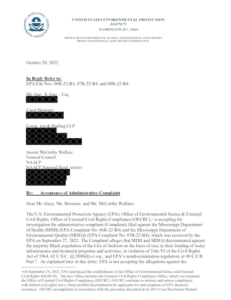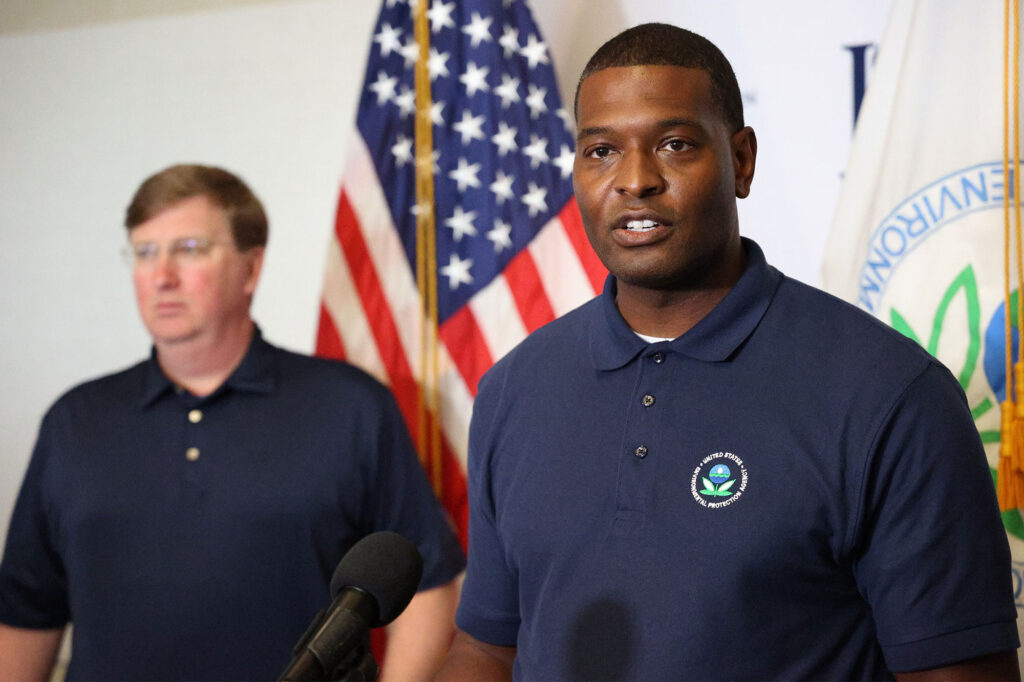The U.S. Environmental Protection Agency has opened an investigation into the State of Mississippi for possible civil rights violations over the lack of reliable access to safe drinking water in the majority-Black capital City of Jackson. The long-running Jackson water crisis came to a head in late August and early September when residents went for weeks without clean running water due to failures at the City’s water treatment facility.
“Today’s decision by the EPA is a significant first step in holding the State accountable for its role in exacerbating the Jackson water crisis,” NAACP Environmental and Climate Justice Director Abre’ Conner said in a Thursday afternoon statement. “For far too long, residents of Jackson, like Black communities across this country, have had water access weaponized against them.”
The NAACP filed a complaint with the EPA against the State of Mississippi in late September, calling for an investigation. “For years, the State of Mississippi, its agencies, instrumentalities, and officials (collectively ‘the State’) have discriminated on the basis of race against the City of Jackson, Mississippi (‘Jackson’) and its majority-Black population by diverting federal funds awarded to ensure safe drinking water and unpolluted surface waters and groundwater,” the complaint alleged.

In a letter today, the EPA said it was “accepting for investigation” the NAACP’s complaint along with the Office of Environmental Justice and External Civil Rights and the Office of External Civil Rights Compliance.
“The Complaint alleges that MDH and MDEQ discriminated against the majority Black population of the City of Jackson on the basis of race in their funding of water infrastructure and treatment programs and activities, in violation of Title VI of the Civil Rights Act of 1964, 42 U.S.C. §§ 2000(d) et seq., and EPA’s nondiscrimination regulation, at 40 C.F.R. Part 7,” the letter says.
Even when Jackson residents have running water, they often experience prolonged boil water orders, such as the one that began a month before the late August water failures and continued until mid-September. The late-summer pump failures at the O.B. Curtis water treatment plant came amid flooding from the Pearl River. In early 2021, residents of the 82% Black city also lost access to running water for weeks after a deep winter freeze.
Though the water problems have grown more acute in recent years, they are not new. Residents have dealt with frequent boil water notices for decades. Officials have warned of risks to the water system since the 1970s, and pipes throughout the capital city have not been properly maintained since the 1950s.
Local leadership has struggled to deal with the City’s water problems, owing in part to Jackson’s dwindling tax base. After desegregation, white middle and upper class families began fleeing Jackson for the outlying suburbs, taking much of the City’s tax base with them. The City has also struggled to retain many of its middle class Black residents in recent years.
Jackson could need more than $1 billion to fully repair and upgrade its water system to end the current cycle of careening from crisis to crisis, but that will require help from the State and federal government. As Jackson’s population became majority-Black after desegregation, though, white Democratic and later Republican politicians often used the capital city as a political punching bag and declined to provide necessary investments into Mississippi’s capital. Reagan-era changes in the way federal funds are appropriated to cities also weakened Jackson’s ability to fund needed infrastructure improvements.
In August, the EPA said that the City of Jackson had failed to pursue new water operations staff, which compounded the problems with operating and maintaining the water system.
In the EPA’s letter Thursday, the agency said that the Office of External Civil Rights Compliance will investigate whether the Mississippi Department of Environmental Quality or the Mississippi Department of Health “discriminated against the majority Black population of Jackson, Mississippi, on the basis of color, by intent or effect, in funding water infrastructure and treatment programs and activities.” The office will also investigate whether either Mississippi agency is implementing safeguards to ensure “that all recipients of federal assistance must have in place to comply with their general nondiscrimination obligations,” including for people with disabilities.

The EPA’s letter cautions that “[t]he initiation of an investigation of the issues above is not a decision on the merits” and says OECRC “is a neutral fact finder and will begin its process to gather the relevant information” and discuss the matter further with the NAACP and state agencies. The agencies says it is providing the Mississippi Department of Health and the Mississippi Department of Environmental Quality “an opportunity to make a written submission responding to, rebutting, or denying the issues that have been accepted for investigation within thirty (30) calendar days” of receiving notice of the investigation.
“We applaud the EPA, Administrator (Michael) Regan, and the Biden Administration for taking this issue seriously and opening a federal investigation into the state’s racially discriminatory use of federal funds for the City of Jackson’s water systems,” NAACP President Derrick Johnson, a Mississippi native, said in a statement on Thursday afternoon. “This action is only the first step. We encourage EPA to move expeditiously to conduct its investigation and to require comprehensive remedies to help resolve this crisis.”
Earlier this week, Rep. Bennie Thompson, Mississippi’s only Black or Democratic member of Congress, and Rep. Carolyn B. Maloney, D-N.Y., announced that Congress is investigating Mississippi’s use of federal water infrastructure funds. In a letter to Gov. Tate Reeves, Thompson and Maloney urged the State to properly fund water repairs for the capital city.
See the Mississippi Free Press’ full Jackson water-crisis coverage, starting in March 2021.










